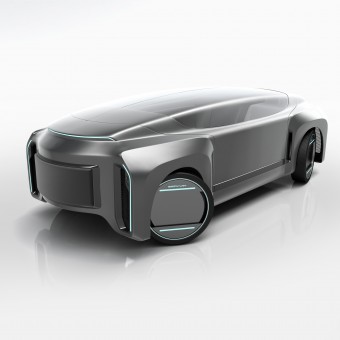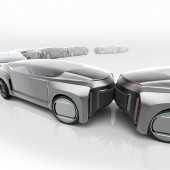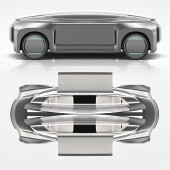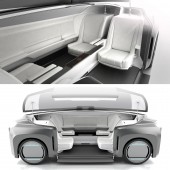
| THE AWARD |
| CATEGORIES |
| REGISTRATION |
| SUBMIT YOUR WORK |
| ENTRY INSTRUCTIONS |
| TERMS & CONDITIONS |
| PUBLICATIONS |
| DATES & FEES |
| METHODOLOGY |
| CONTACT |
| WINNERS |
| PRESS ROOM |
| GET INVOLVED |
| DESIGN PRIZE |
| DESIGN STORE |
| THE AWARD | JURY | CATEGORIES | REGISTRATION | PRESS | WINNERS | PUBLICATIONS | ENTRY INSTRUCTIONS |
Servvan Robotic Vehicle by Dmitry Pogorelov |
Home > Winners > Design #30680 >Interview |
 |
|
FS: What is the main principle, idea and inspiration behind your design?
DP: I would like to revise the car, the vision of its place in the modern world. The car was no longer a means of transportation, it is a luxury. Comfort was to prevail over the function of movement: downtime in traffic jams have become the norm and people are care about on how comfortable they will feel at this time. People already do not care how fast they get to the house. In fact, sometimes faster to get by public transport. That's why I wondered, is it possible to make the car as a means of transportation more efficient? But what I thought should be in the system and the system should be controlled by the super-system, ie supercomputer, which should be responsible for all the life-support system. In my project, I do restore the original idea of the car as a means of transportation and increase its efficiency by rethinking of values and use it in everyday life by 100%. The design of cars ceased to be a design. Design in a modern automobile serves as a stylistic rather than functional, as it was originally intended. Efficiency of designer sank. The aim was to make the most simplest, clear intuitive vehicle without unnecessary and frivolous lines, as is done now BMW, Mercedes, Citroen and all other automakers seeking to get monetary gain, but not to solve global problems. So, I created a service vehicle for resource based economy developed Jacque Fresco, forming a network with other vehicles. A single system allows to communicate with each other, which increases the efficiency of passengers transportation, as well as an increase in efficiency due to the movement in the road train (reducing of FX factor, the distance between vehicles). The car has unmanned control. Vehicle is symmetrically: cheap to produce. It has a four swivel motor-wheels, and the possibility of reversing motion: maneuver with large dimensions. Boarding vis-a-vis improves communication of passengers.
FS: What has been your main focus in designing this work? Especially what did you want to achieve?
DP: First of all it was necessary to achieve the efficiency of the car's design in its direct functionality and frequency of use. No nonsense, no contrived lines. All items are extremely functional. I always wondered why I do it. Then you had to do it in a system, so it was necessary to devise a system connections and interactions. It should be to make it cheap; because of it does not have the driver and it is robotic, so it makes no difference in which way to move. Symmetrical car perfectly suit to reduce the cost of production, as well as maneuverability. Boarding “vis-à-vis” improves communication of passengers. Vehicles are combined into a single system, so they can communicate with each other, that increases the efficiency of transport of passengers, as well as an increase in efficiency due to the movement in the road train (reducing of FX coefficient, the distance between vehicles).
FS: What are your future plans for this award winning design?
DP: This project was as workout for my mind. In general, this project was made for my ideal world. Like any my projects, the project Servvan is my face and show my abilities as a designer. If it is possible in the future to implement this project, it will likely have a slightly different design more advanced because with changing technologies design approach is also change. Yes, it's a good project for my future.
FS: How long did it take you to design this particular concept?
DP: Oh, it was quite hard. This project lasted for about 5 months. It is very difficult to immediately understand what is required. But as the closer was the finale, the picture becomes clearer.
FS: Why did you design this particular concept? Was this design commissioned or did you decide to pursuit an inspiration?
DP: It likely was the inspiration and desire to embody my thoughts in life. The project started in the academy, but I didn’t find support from teachers. They are too conservative and they want all of the projects were for nowadays. I looked forward to 20-30 years. Yes, the task sounded like "service vehicle for the government." I consider myself a person of the planet Earth and would not want to play in political games, then I had a project appropriate for the world, for all people, so that all people were equal. But this system should be united. Teachers from my academy wanted to see the car for the government. While they said consider whether the government in the future? Of course, I said that it will not. I still do not understand the position of teachers, but they refused to advise me, because I did a car for non-political control. The car have to bring people to the required destination, as it have to be in the service of people. I think I respond on task "service car". But teachers put me three marks two of a possible 5 (mark two - the lowest score in Russia) for the idea, and feeding schedule, although everything was in perfect condition. This was their matter of principle. Of course, they then fixed everything by 4 marks (I was a successful student), but our opinions could not agree.
FS: Is your design being produced or used by another company, or do you plan to sell or lease the production rights or do you intent to produce your work yourself?
DP: This design shows my possibilities as a designer, my ability to think creative with another components of the world that could influence on the model of design.
FS: What made you design this particular type of work?
DP: As I am a specialist of transportation design, and that the project was in my matching.
FS: Where there any other designs and/or designers that helped the influence the design of your work?
DP: I admire the works of industrial designer Jacque Fresco, how he thinks. His approach is acceptable for me. I do not even know exactly how much I got into the trend of thought of the designer, who is known for having created the Venus project. But I hope that my project is consistent with the approach to the design of Jacque Fresco. This is not my last project, so I think it will find more developed in the future.
FS: Who is the target customer for his design?
DP: Of course customers are all people, who should live in a resource based economy. This concept is especially for employees of the system.
FS: What sets this design apart from other similar or resembling concepts?
DP: The approach of design. As I said, I redefined the concept car in the context of contemporary design. Efficiency designer recently greatly fallen and is only "how better to draw the line on the body of the car." It deals only with the outer wrapper, on the functional part of the practically unchanged. I approached to the car as something new. The designer must not only adapt to the needs of the world, but also to offer his vision, as it did Steve Jobs. Therefore, I propose a completely new approach in the design of vehicles, which I have reflected in my project. And about my approach to the design you can learn from my previous interview.
FS: How did you come up with the name for this design? What does it mean?
DP: The name came from two components. There are service and van. Although here the van is not very suitable itself, but I saw and heard in the name sounds considerations. This word has a fraction of a symmetry that reflects the symmetry of the vehicle itself. So it happened Servvan.
FS: What is the most unique aspect of your design?
DP: I think it is systemic. All our transportation problems are because of every drivers think differently. Everyone wants to satisfy his need to own, and it is actually problem both for humans and for nature. Man will never be able to satisfy their needs, but possibilities of nature are not unlimited, at least here on the Earth. Parents told us from childhood, that all the problems in ourselves. And the solution should look for in ourselves. It turns out that the Earth is not to blame that it can not give us more: more resources, more space, more clean places. Insatiable ego of a human itself is guilty. It turns out that we have to work with the system of human values, not exacerbate and pamper him like a baby. That is why the task of the designer enters instilling new outlook on life. I mentioned this in a previous interview. So I can say that the deep aspect of my unique design is a new system of values.
FS: Who did you collaborate with for this design? Did you work with people with technical / specialized skills?
DP: A single teacher who advised me was a technical specialist, with whom we have developed a system of coupling magnets. He proposed mechanical scheme, but it would look very bad. And so the only assistant was information from the Internet.
FS: What is the role of technology in this particular design?
DP: Technology in my design play a key role. As I suggest only the concept, I'm not saying that everything should be as shown in the vehicle. But the principle should be that way. Design can change if will come up new technology. My design reflects the technology that is available at the moment: motor-wheels, automatically system of car control by Google, smart magnet system, order something by telephone.
FS: Is your design influenced by data or analytical research in any way? What kind of research did you conduct for making this design?
DP: Of course yes! When buying a new car for $ 23,000 for the first year of operation it takes into account write-downs and other costs that you spend 50 cents per 1 km of track. If you take public transportation such as bus, then you will come out of 6-10 cents per 1 km of track. If you take a compromise transport as a taxi, it will cost 15-20 cents per person, or 4-5 cents per person if in a taxi to go to 4 people. It is becoming clear that the benefits go to four of them on a taxi, rather than buy a car and drive by one or two. Further reduce the cost of the service, removing the driver and putting the automatic control. According to Google, such a system will also contribute to: 1. Reducing the number of road accidents by 90%. 2. Spend less time and fuel on the way to 90%. 3. Reducing the number of cars by 90%. This creates a completely efficient vehicle.
FS: How did you decide to submit your design to an international design competition?
DP: I was looking for serious competition or prize where I could approve the project as a perspective. Since my teachers identified as my project unviable. Participation in this category was a matter of honor. I was able to protect my honor and I would like to thank the jury of this competition for recognition.
FS: What did you learn or how did you improve yourself during the designing of this work?
DP: Once again, I learned that the design possibilities are endless. I like what I did, but did not expect such a result in the beginning of the design.
FS: Thank you for providing us with this opportunity to interview you.
A' Design Award and Competitions grants rights to press members and bloggers to use parts of this interview. This interview is provided as it is; DesignPRWire and A' Design Award and Competitions cannot be held responsible for the answers given by participating designers.
| SOCIAL |
| + Add to Likes / Favorites | Send to My Email | Comment | View Press-Release | Translations |





